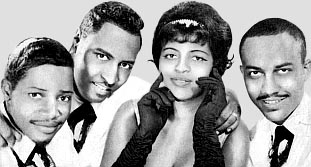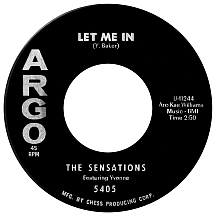THE SENSATIONS
Let Me In
Sisters Yvonne and Ernestine Mills dreamed of show-biz careers while growing up in Philadelphia during the '40s, and it turned out they had the singing talent to make those dreams a reality. Alphonso Howell realized a similar goal, putting his deep bass voice to use at age 15 with street corner group The Quantrells. Yvonne Mills' boyfriend, baritone singer Tommy Wicks, once took first place in a singing contest at a Philly nightclub; Herb Abramson of Atlantic Records, on the lookout for fresh talent, was a judge that evening. Tommy had made a contact in New York City...at the top rhythm and blues label, no less!
The Cavaliers were formed in 1954 with Wicks, Howell, Roosevelt Simmons, Warren Sherrill and Tody Mott. Personality clashes resulted in changes shortly afterwards; Mott joined another group he felt held more promise and Sherrill joined the Air Force (he fronted another Philly outfit, The Del Knights, after his discharge a few years later). A new member was needed for the Cavaliers and Tommy suggested Yvonne. The others liked the idea of having a girl in the group, but she got cold feet and refused. Through an acquaintance, the Cavaliers met Joe Morris of New York's Herald Records, a major player with a pair of late 1953 R&B hits (Faye Adams' first chart-topper "Shake a Hand," which he had composed and arranged, and "I Had a Notion" under his own name, featuring vocalist Al Savage). The Cavaliers made their first recordings with Morris in New York, but those efforts were never released.
In the summer of '55 the group, Yvonne included, entered a talent show hosted by WHAT-AM's morning man, longtime Philadelphia radio personality Kae Williams. Despite her hesitancy to sing with "a bunch of boys," as she called them, it was Yvonne who most impressed "Daddy Kae." He offered to manage them and was told she was not a permanent member. He insisted they convince her to join...otherwise, no dice! She agreed, expecting to be nothing more than a backing singer. Tommy told Kae about his encounter with Abramson and an audition was arranged. "Yes Sir That's My Baby" (a 1925 chestnut written by Walter Donaldson and Gus Kahn) featured Simmons on lead, but Atlantic honchos Abramson, Jerry Wexler and Ahmet Ertegun suggested Yvonne give it a try; a recording contract was then offered on the condition she would be lead singer. That necessitated another change: the Atlantic execs felt "Cavaliers" wasn't suitable for an act with a female lead. The ever-optimistic Wicks suggested The Sensations, a name he felt accurately described the group.
Radio stations weren't interested in the leisurely "Yes Sir" when it was released on Atlantic's Atco label in the fall of 1955...except in Philly, where Kae Williams hyped it up it. He booked them to open for the company's hottest act, Ray Charles, at Philadelphia's Town Hall in November, an opportunity nearly derailed when police raided Charles' dressing room and found drugs in his possession. The show went on as scheduled but most of Charles' entourage spent the night in jail while Ray posted bail and vowed to never again perform in the so-called "City of Brotherly Love." The Sensations were mentioned in newspaper reports and had concerns about it damaging their image, but Williams had a different perpective: any publicity is good publicity! The next Town Hall show, just before Christmas, went smoothly; the group opened for the remarkable Ruth Brown. Lee Andrews and the Hearts, another group Kae managed, also performed.
In February 1956, "Yes Sir That's My Baby" made a surprise one-week showing on the national R&B best seller charts as the Sensations embarked on a whirlwind tour of eastern U.S. cities that climaxed in the spring at New York's high-profile Apollo Theater. Yvonne was becoming more comfortable in her role as lead singer; a second single, "Ain't He Sweet" (a gender-adjusted version of "Ain't She Sweet," composed by Milton Ager and Jack Yellen in 1927) made obvious Atlantic's preference for having the group record moldy standards. But disc jockeys felt differently; the flip side, William Miller and Billy Dawn Smith's "Please Mr. Disc Jockey," received airplay on a number of stations, became a highlight of the group's stage shows, and hit the R&B charts in May (it was, perhaps, the first of an ongoing series of rock and roll "deejay request" songs that include Tina Robin's "Dear Mr. D.J. Play it Again" and Van McCoy's "Mr. D.J." in '61, Sam Cooke's "Having a Party" in '62 and "Play Those Oldies, Mr. Dee Jay" by Anthony and the Sophomores in '63).
Tommy and Yvonne's long-running romance eventually ran its course. She married Frank Baker, a former road manager for the group. In the fall of 1957, Yvonne gave birth to a daughter (named after one of her favorite singers unrelated to her husband, Atlantic star LaVern Baker). She left the Sensations in early '58 after "Kiddy Car Lover," the sixth single and fourth consecutive stiff. The rest of the group decided to call it quits around the time Kae Williams' latest discovery, The Silhouettes, hit number one with "Get a Job."

Alphonso Howell and Yvonne Baker ran into each other by chance a couple of years later and decided to reform the group. Simmons and ex-boyfriend Wicks had moved on, so they called on tenor Richard Curtain and baritone Sam Armstrong to fill their spots. Recording sessions were held in Philadelphia in early 1961 and Kae Williams licensed the masters to Chicago's Chess Records while keeping them under a separate contract (a more advantageous deal than the Atco arrangement). In the summer of '61 the group had a solid hit on the Argo label (a Chess subsidiary) with "Music, Music, Music" (written by Stephan Weiss and Bernie Baum, it had been a number one hit for Teresa Brewer eleven years earlier); the song's lyrics were modernized and adjusted for inflation ('Put another nickel in...in the nickelodeon...' became 'Put another dime in...hear the records playin'...') and a lengthy chorus of 'Wooo-oooo-ooo...woo! woo-ooo...' was a far cry from Brewer's Dixieland version.
Next came the giant hit The Sensations will always be remembered for. "Let Me In," written by Yvonne with input from just about everyone else, utilized a full bag of tricks: a similar but more pronounced vocal hook ('Wee-ooo...wee-oo...ooo-wee-ooo!'), a veiled reference to Kae's greatest hit ('I can see the dancin'...the silhouettes on the shade...'), a description of a wild dance party ('Pitter patter of the fee-ee-ee-ee-eet...movin' and a-groovin' with that beat...jumpin' and stompin' on the flo-o-o-o-oor...') and Yvonne's desperate plea ("Let me in! Open up! Why don't you open up that door?') against an urgent, fast-tempo arrangement, made for an irresistible sum total. Stations began playing the song toward the end of '61, it made a splash on the national pop charts in January '62 and reached the top ten in March, then hit number two on Billboard's R&B survey and number one on the corresponding Cash Box chart.
Yvonne's star seemed to be rising, but Williams and Argo boss Leonard Chess seemed unsure of how to promote her; some 45s of "Let Me In" credited The Sensations Featuring Yvonne while others simply listed the group's name. Even her professional moniker was undecided as writer credit alternated between Y. Mills and Y. Baker. The follow-up, "That's My Desire" (composed in 1931 by Helmy Kresa and Carroll Loveday, it had been Frankie Laine's debut smash in 1947), was released as Yvonne Baker and the Sensations to the dismay of other group members; Armstrong left at this time and was replaced by Tommy Cook, a friend from the old neighborhood. A fourth Argo disc, "Party Across the Hall," continued the "Let Me In" scenario, taking place after singer Yvonne was...let in! The song had clever tongue-twisting lyrics and an 'Ooo-wee-ooo' reprise, but failed to excite radio programmers.
Williams released a couple of singles (one by the Sensations with Yvonne, another a solo Yvonne Baker effort) on his own Junior label. After one final Argo 45, the quartet recorded exclusively for Junior, though Kae sometimes licensed promising tracks to larger labels including Jamie and Vee-Jay's Tollie subsidiary. The group broke up for good in 1966 but Yvonne kept going for awhile; her sister, recording as Ernestine Eady, had a single on Junior in 1965 ("The Change," also released on Scepter) and another on Phil-L.A. of Soul, with Williams producing, in 1967 ("Let's Talk it Over").
A strange duet by Daddy Kae and Yvonne came out in '67 on the Fairmount label. Instead of singing, Baker spoke her lines in "Eleven Commandments of Woman," an alternate version of Jamaican ska singer Prince Buster's "Ten Commandments (From Man to Woman)" combined with Princess Buster's "Ten Commandments" answer disc. Yvonne began focusing less on her music career in order to spend more time with her husband and daughter. She recorded the Billy Jackson-Joe Renzetti-Jean Wells song "You Didn't Say a Word," a hot soul production with a spy-sound arrangement, for Parkway in 1967. It wasn't a hit at the time but has gained a large following over the years; alas, brilliance isn't always recognized on first impression. After "A Woman Needs a Man," a 1968 single on Modern written by Van McCoy and produced by Kae Williams, Yvonne Baker apparently took the song's advice and retired from the occupation of making music.


